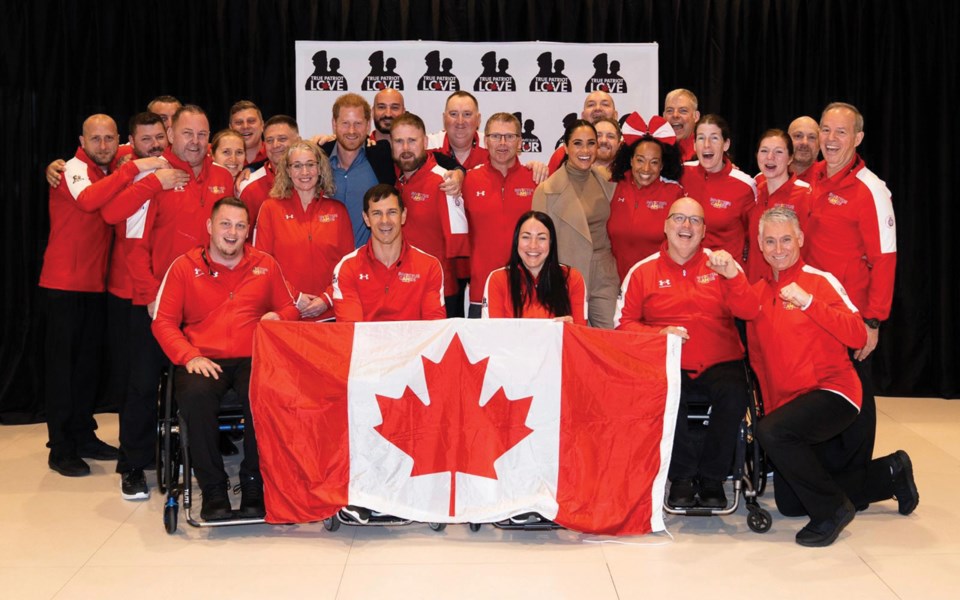Whistler will continue its legacy as a mountain host for major winter sporting events and expand its reputation as an adaptive sport destination when it welcomes the first-ever hybrid Invictus Games in 2025.
Prince Harry, Duke of Sussex, announced the event would be coming to Whistler and Vancouver at the Invictus Games closing ceremonies in The Hague, Netherlands on Friday, April 22. A tentpole sporting event for wounded, injured and sick servicemen and women, the 2025 edition will be the inaugural hybrid summer-winter Invictus Games, featuring adaptive winter sports such as alpine skiing, Nordic skiing, skeleton and wheelchair curling for the first time.
“Whistler shares a commitment to inclusion and diversity and our winter sport hosting roots run deep, so the inclusion of winter sports in the Invictus Games for the first time is an excellent fit and it’s exciting to imagine the Invictus Games on snow,” said Whistler Mayor Jack Crompton at the April 26 council meeting.
The Games will be held in Whistler and Vancouver throughout February 2025.
In the works for years, the Whistler Adaptive Sports Program (WASP), with the support of Vail Resorts and Whistler Sport Legacies, was instrumental in the resort landing the Games.
“This is actually an idea that we had in 2015. We met with the Invictus Foundation and pitched the idea of a winter games,” explained WASP executive director Chelsey Walker, who added that it took a few years to have a bid group pick up the idea—in this case, the True Patriot Love Foundation, a Toronto-based charity dedicated to supporting military members, veterans and their families.
The charity floated the concept of a hybrid Games, and initially, three Canadian cities were considered, before being narrowed down to Whistler and Vancouver. In January, the bid was finalized and submitted to the Invictus Games Foundation, which approved the proposal last month.
Five hundred athletes from 20 nations are expected to compete, and in Whistler, Walker said organizers are planning for up to 600 athletes, trainers and support staff to make use of local facilities—many of which are legacies from the 2010 Winter Olympics.
“I think it will be great to showcase the infrastructure that we have, thanks in large part to 2010,” said Whistler’s Christine Cogger, who served as the medal ceremony producer at the 2016 Invictus Games in Orlando and the 2017 Games in Toronto. “We have so many great facilities that, in my humble opinion, are underutilized, and I would love to see us attracting a different variety of events, whether they’re grassroots or international. I think we have a lot of potential.”
Whistler is slated to host skeleton, as well as Nordic skiing and alpine snow sports. Walker said the Games are an opportunity to grow the resort’s reputation as an adaptive sport destination.
“It’s huge because the reach of the Games is global,” she said. “One of the things that we’re really looking to do is reach into different nations and find individuals who might not have ever considered winter sports as an option. So you might be from a sand country and not realize that you can still Nordic ski on a mountain board. Or that you can do biathlon using an echolocation rifle.
“It’s great to reuse these [Olympic legacy] facilities and our programming in order to benefit another segment of the adaptive community, being ill and injured servicemen and women.”
Along with its existing adaptive programming and facilities, Whistler has made major in-roads into the military community thanks to hosting past groups like Soldier On, a program that helps serving and retired Canadian Forces personnel with permanent or chronic illness or injury stay active, as well as Vail Resorts’ Military Epic Pass.
Walker believes the Games will only further military tourism to the resort.
“That largely speaks to the commitment Vail Resorts has to the military community,” she said. “Just the familiarity and the support that is already there for the military community will definitely be huge.”
More importantly, like the Olympics before it, Invictus should help spur investment in adaptive infrastructure and programming.
“For us at Whistler Adaptive, we’re not really focused just on accessible sport … It’s really about sport development and creating additional opportunities for people to participate in sport on a long-term basis,” Walker said.
Billed as “the most innovative and accessible Games ever held,” Invictus will also be co-hosted by Whistler and Vancouver’s First Nations, the Lil’wat, Musqueam, Squamish and Tsleil-Waututh, “so you’ll see a large Indigenous participation within these Games,” Walker added.
The Invictus Games at The Hague held from April 16 to 22 were originally scheduled for 2020 but were postponed by the COVID-19 pandemic. Twenty-eight Team Canada athletes competed.
For more information, visit invictusgamesfoundation.org.





